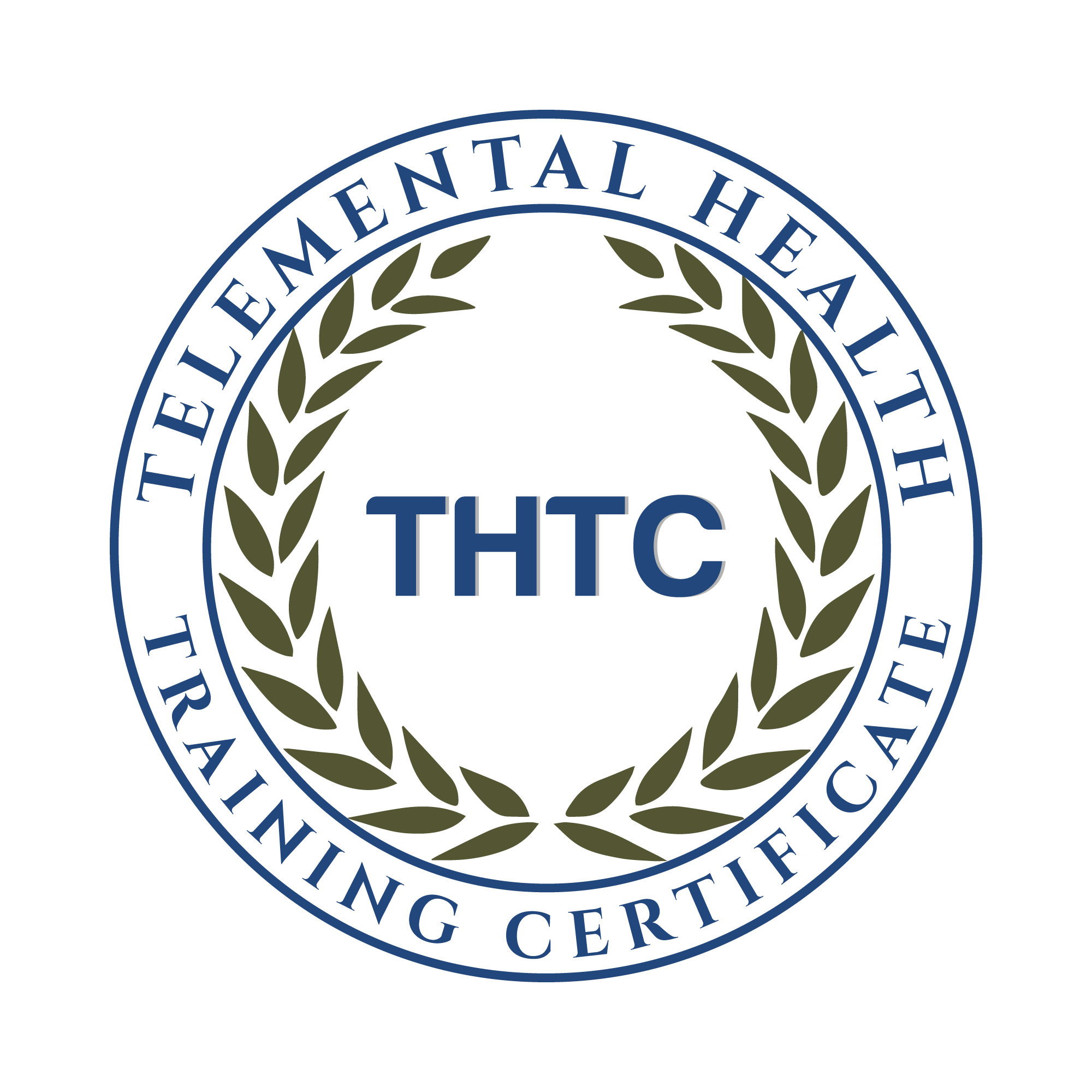TeleMental Health Training Certificate Program Details
- The THTC Program
- Description
- How to Attend
- Topic List & Competencies
- CE Hours
- Instructor(s)
- How to Obtain the THTC Certificate
- Course Policies
- Completing the Program and Receiving your Certificate
- Who Should Attend
- Teaching Methods
- Course Availability
Select each tab above to view specific details of the TeleMental Health Training (THTC Certificate) program
Expand Your Practice…Enhance Your Career…Fill the Need
This course is designed to prepare you to effectively provide telemental health services.
It covers all of the essential competencies of using technology in practice and of providing services from a distance.
There are eight topics in this course:
- Introduction to TeleMental Health
- Legal Aspects of TeleMental Health
- Ethics of Using Technology in Behavioral Health
- HIPAA Compliance for Mental Health Professionals
- Ethical, Legal, and Clinical Aspects of Selecting Technology
- Emergency Management Planning for TeleMental Health
- Screening for Fit for TeleMental Health Services
- Ethical and Clinical Skills of Video and Phone Sessions

- Offer your clients more ways to have sessions with you.
- Meet the demand for online counseling.
- Reduce risk for your client, your license, and your practice.
- Adhere to your code of ethics and practice within your boundaries of competence.
- Become a preferred provider for insurance companies, EAPs, and organizations who are seeking telemental health providers.
- Register for the course
- In the navigation bar above click on the “My Courses” tab
- You then can access this course by clicking on its title
This is a non-interactive, self-study program.
Introduction to TeleMental Health
- Define Telehealth and telemental health
- Explain the benefits of telemental health
- Explain the possible drawbacks and risks of telemental health
- Describe the support for telemental health
- Describe the history of telemental health
- Summarize the research findings on telemental health
- List the types of settings and locations of telemental health
- List three resources for telemental health updates
Legal Aspects of TeleMental Health
- Explain how to determine if you can legally practice telemental health
- Explain how to determine if you can provide clinical services to a client who is not located in the jurisdiction in which you have obtained a professional license
- Describe how to handle a situation in which a client is going to be outside the jurisdiction in which you are authorized to practice while requesting your clinical services
Ethics of Using Technology in Behavioral Health
- List the sources of telemental health ethical guidelines
- Explain how you can ensure to practice within your boundaries of competence when providing telemental health
- Explain how to ethically use social media and create a social media policy
- List at least five topics that ought to be in an informed consent related to telemental health
- Explain how to verify identity when providing telemental health services
- Describe three possible ethical dilemmas that can occur when providing telemental health
HIPAA Compliance for Mental Health Professionals
- List four sources for privacy law in the United States
- List three risks to confidentiality when using technology
- Define a breach to protected health information
- Explain the steps to becoming HIPAA compliant
- Explain the requirements of the privacy rule in HIPAA law
- Explain the requirements of the security rule in HIPAA law
- Explain the requirements of the breach notification rule in HIPAA law
- Explain how to conduct a risk analysis and create a risk management plan
- Describe the three safeguards in HIPAA law
- Explain when you need to obtain a Business Associate Agreement
Ethical, Legal, and Clinical Aspects of Selecting Technology
- Explain the ethical considerations in choosing technology
- Explain the legal considerations in choosing technology
- Explain the clinical considerations in choosing technology
- List the steps of choosing technology for clinical services
- List the considerations in choosing technology for clinical records
- List the considerations in choosing technology for video conferencing
- List the considerations in choosing technology for messaging
- List the considerations in choosing technology for phone calls, voicemail, and fax
- List the considerations in choosing technology for payment processing and document transferring
- List the considerations in choosing technology for data storage, backup, and archiving
- List at least seven technology components using in video conferencing
- Describe how to prevent, respond to, and process with clients technology issues
Emergency Management Planning for TeleMental Health
- Establish with the client an emergency management plan for each session in both a supervised and unsupervised environment
- List what information is required in order to create an emergency management plan
- Explain the process of responding to an emergency during a telemental health session
Screening for Fit for TeleMental Health Services
- Assess if a prospective and/or current client is a fit for telemental health services
- List at least three reasons why an individual may not be a fit for telemental health services
Ethical and Clinical Skills of Video and Phone Sessions
- Describe the different technology and environment used when providing video sessions
- List the potential issues caused by clinicians when providing video sessions
- List the potential issues caused by clients with receiving video sessions
- Explain video session etiquette
- List the steps or providing video sessions
- Explain how to prepare a client for a video session
- Respond to and process tech issues with a client
- Explain possible applications used during a video session
- Explain how to register a client and collect payment when a client is in a different location than the clinician
- Explain how to prepare a client for a phone session
- Describe phone session skills
- List the benefits and drawbacks of phone sessions
Credit Hours:
This course provides 10.5 credit hours (6 of which are ethics)
Counselors: Telehealth Certification Institute, LLC has been approved by NBCC as an Approved Continuing Education Provider, ACEP No, 6693. Programs that do not qualify for NBCC credit are clearly identified. Telehealth Certification Institute, LLC is solely responsible for all aspects of the programs.
Telehealth Certification Institute, LLC is recognized by the New York State Education Department's State Board for Mental Health Practitioners as an approved provider of continuing education for licensed mental health counselors. #MHC-0048. Approval renewal date: 1/31/2023
Marriage and Family Therapists: Many MFT licensing boards accept our courses or one of the approvals which we have from professional associations. You can check with your board to determine if this course would be accepted by your licensing board.
Social Workers: Telehealth Certification Institute LLC, #1609, is approved to offer social work continuing education by the Association of Social Work Boards (ASWB) Approved Continuing Education (ACE) program. Organizations, not individual courses, are approved as ACE providers. State and provincial regulatory boards have the final authority to determine whether an individual course may be accepted for continuing education credit. Telehealth Certification Institute LLC maintains responsibility for this course. ACE provider approval period: 05/02/2018 – 05/02/2021. Social workers completing this course receive 6 ethics continuing education credits and 4.5 clinical continuing education credits.
Telehealth Certification Institute, LLC is recognized by the New York State Education Department's State Board for Social Work as an approved provider of continuing education for licensed social workers #SW-0435. Approval renewal date: 2/28/2023
Addiction Professionals: Telehealth Certification Institute is an approved provider of continuing education by NAADAC, the Association for Addiction Professionals, provider #193104. Full attendance is required; no partial credit will be awarded for partial attendance.
Psychologists: Telehealth Certification Institute LLC is approved by the American Psychological Association to sponsor continuing education for psychologists. Telehealth Certification Institute LLC maintains responsibility for this program and its content.
Other Professionals: This course qualifies for 630 minutes of instructional content as required by many national, state and local licensing boards and professional organizations. Retain your certificate of completion and contact your board or organization for specific filing requirements.
Raymond Barrett, LMHC, LPC, BC-TMH, M.S., has extensively provided telemental health counseling services in private practice, for facilities, and for an EAP program. Both as a practitioner and trainer, his aim is to fill every knowledge gap as it arises in the telemental health profession, and that his training allows for immediate implementation. Ray has developed several courses on telemental health and ensures his courses are kept updated. Trainees find Ray to be very approachable, available and knowledgeable. Ray appreciates hearing from each training participant individually in order to fulfill their specific learning needs and to incorporate their questions and successes into the training program. He has presented on telebehavioral health at several conferences and has assisted many organizations to create, launch, and enhance their telehealth programs through his consultation services.
Included in this training program is your THTC. You can obtain your THTC certificate after attesting to completing the entire THTC program.
Accommodations for Individuals with Disabilities
Click here to view our Accommodations for Individuals with Disabilities.
This course includes closed captioning.
Cancellation Policy
Refunds are offered within the first 30 days for courses which have not been completed. There is a $25 service fee for refunds.
Grievance Policy
To receive your certificate of completion you must complete the course in its entirety.
This course is completed by registering, logging in, navigating to your course using the blue navigation bar (My Courses – the Course Title), completing all of the modules, completing and passing the post-tests, and completing the course evaluation.
You can receive your certificate of completion by: logging onto this website, navigating to the course using the blue navigation bar (My Courses – the Course Title), scroll to the bottom of your course, and click on your certificate to either download it or print it.
Here is a visual guide with detailed instructions.
You can view the steps on how to complete a course by clicking here.
This course is intended for clinicians who provide behavioral health services.
Teaching methods for this course include recorded lectures, videos, a post-test, and a course evaluation. The courses may include required reading.
You have six months to access online courses from the time of purchase.

What is the THTC Program?
The TeleMental Health Training Certificate (THTC) is awarded to dedicated telemental health clinicians who have successfully completed this program. Our THTC program provides evidence-based, advanced, and comprehensive training that prepares clinicians to offer behavioral health services while in a different location than the client through the use of technology. There are several other terms used for TeleMental Health such as E-Psychology, Technology-Assisted Social Work, Web-Based, Virtual, Distance Counseling, Telebhavioral Health, Telehealth, TeleMedicine, Online Counseling, Skype Counseling, and Tele-Therapy.
Clinicians who have earned the THTC take special consideration of their clients' privacy as it relates to the use of technology, and the needed effort to ensure that they remain up-to-date on the best practices of providing services remotely.

Who is it for?
The THTC program is for any behavioral health professional, including but not limited to, counselors, social workers, marriage and family therapists, psychologists, physicians, nurses, and chaplains.
Clinicians who have earned the THTC take special consideration of their clients' privacy as it relates to the use of technology, and the needed effort to ensure that they remain up-to-date on the best practices of providing services remotely.
Non-intereactive self-study programs are completed by:
- Registering
- Logging in to your account on the website
- Go to My Courses and select the course title
- Complete the required elements (watch the training videos, complete the post-test with a score of 80% or higher)
- Your certificate of completion unlocks when the previous steps have been completed. You receive your certificate by downloading or printing the certificate from the course page.
- Registering
- Logging in to your account on the website
- Go to My Courses and select the course title
- Complete the required elements (attend the webinar and participate on camera in its entirety, complete the course evaluation)
- Your certificate(s) of completion unlock(s) when the previous steps have been completed. You receive your certificate by downloading or printing the certificate from the course page.


Ready to Begin Offering Telemental Services?
What's in the TeleMental Health Training Certificate Program?
Introduction to Telemental Health
Ethics of Using Telemental Health in Bahavioral Health
Ethical, Legal, and Clinical Aspects of Selecting Technology
Screening for Fit for Telemental Health Services
Legal Aspects of Telemental Health
HIPAA Compliance for Mental Health Professionals
Emergency Management Planning for Telemental Health
Ethical and Clinical Skills of Video and Phone Sessions

Validation of the THTC Program
The program has been thoroughly reviewed and rigorously assessed by an advisory committee made up of professionals who are considered to be experts in their field of practice with years of applicable experience embedded into the program. The committee is made of professionals in the area of clinical psychology, social work, clinical supervisors, and professional counselors so a diverse pool of knowledge is in place to present a training program that is truly comprehensive in these content areas. The advisory committee strives to remain abreast of the latest developments and updates in the world of telemental health services and incorporates these ever-growing changes into the training to maintain the timeliness and relevancy of the program. There was an exhaustive review of the codes of ethics from a large number of behavioral health professional associations and licensing boards, the professional literature, and in-depth research to finally construct the certificate training program.



The course was so informative and I was glued to my screen for the entire duration. I received so much knowledge concerning ethics in telehealth and I am greatly encouraged to read about all the standards and policies that pertain to my practice. Thank you!.